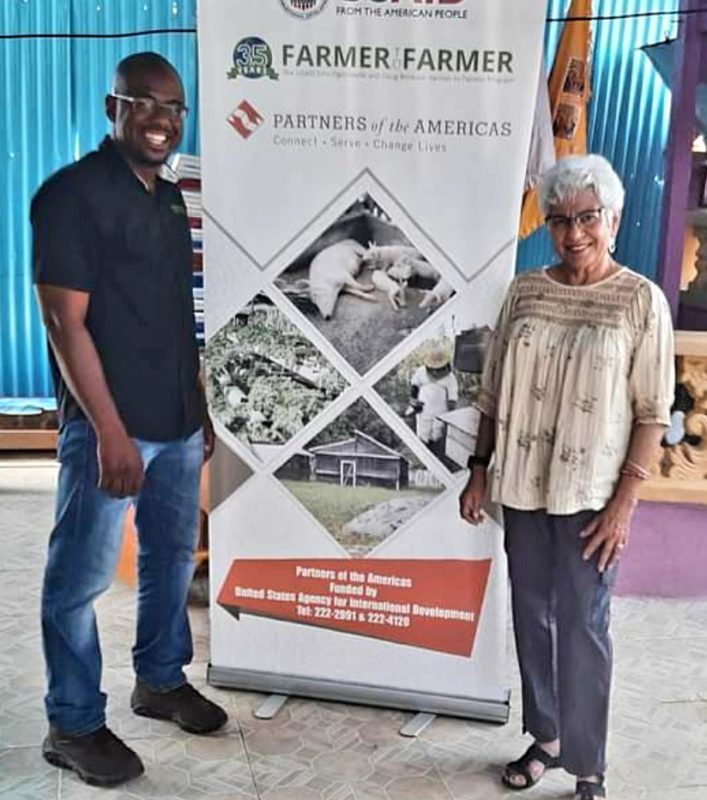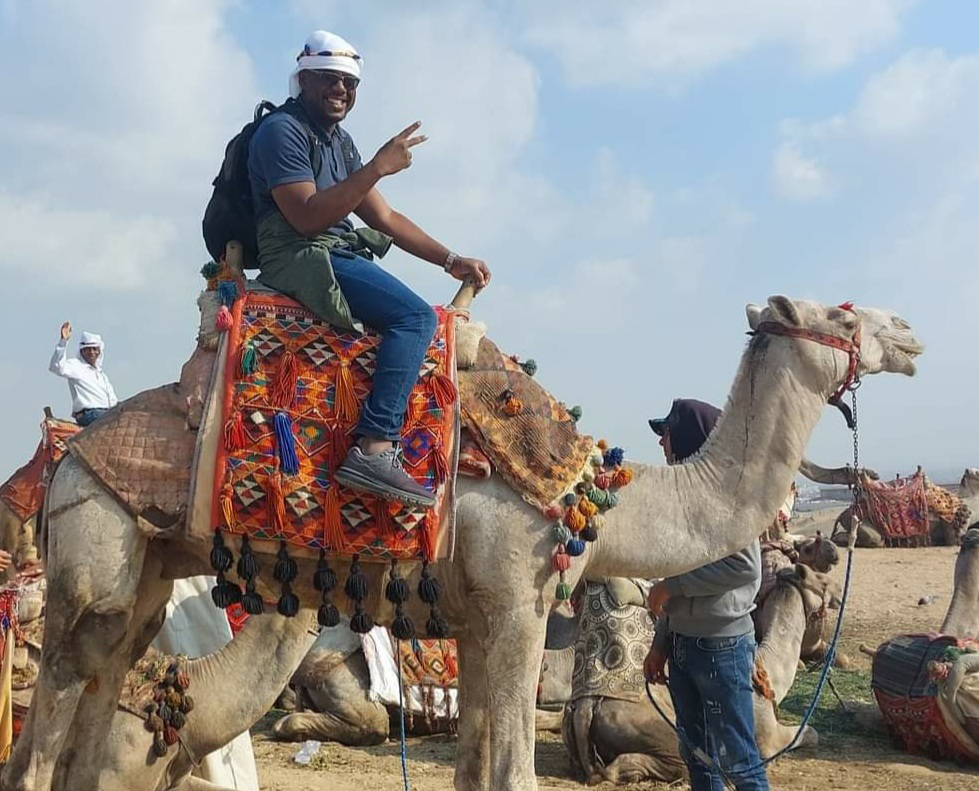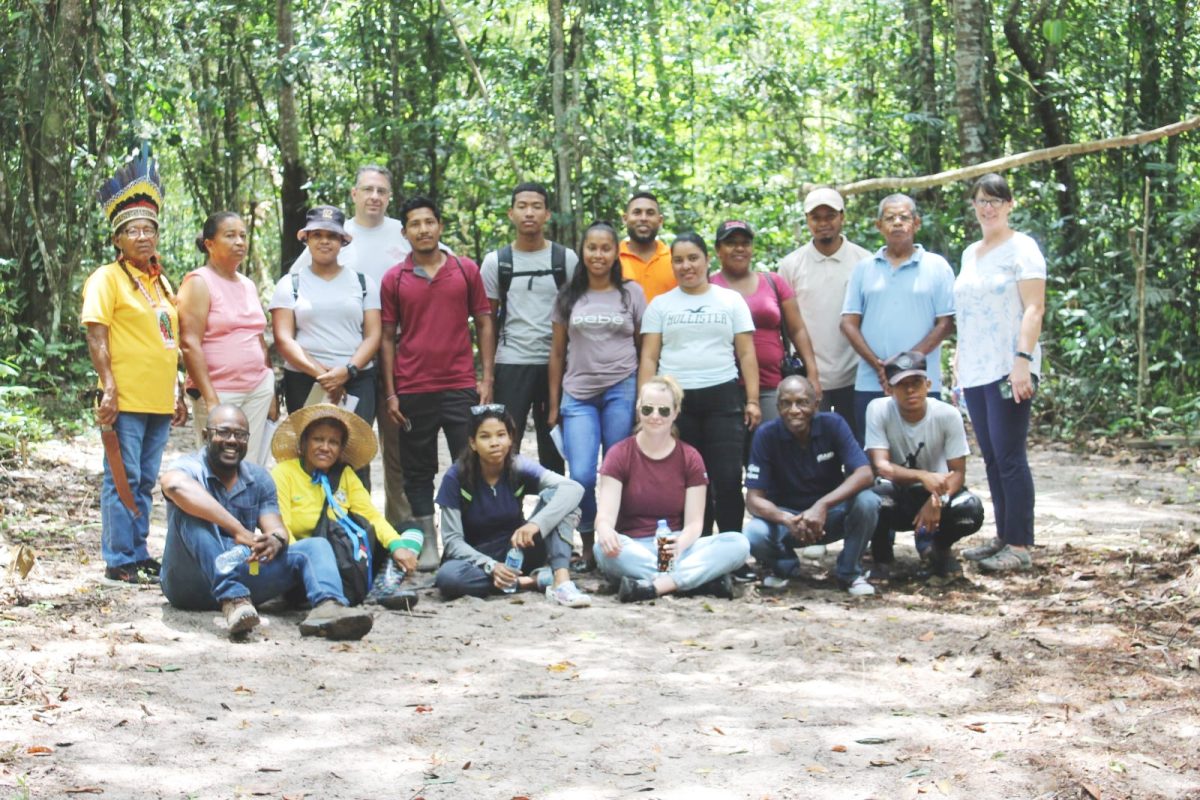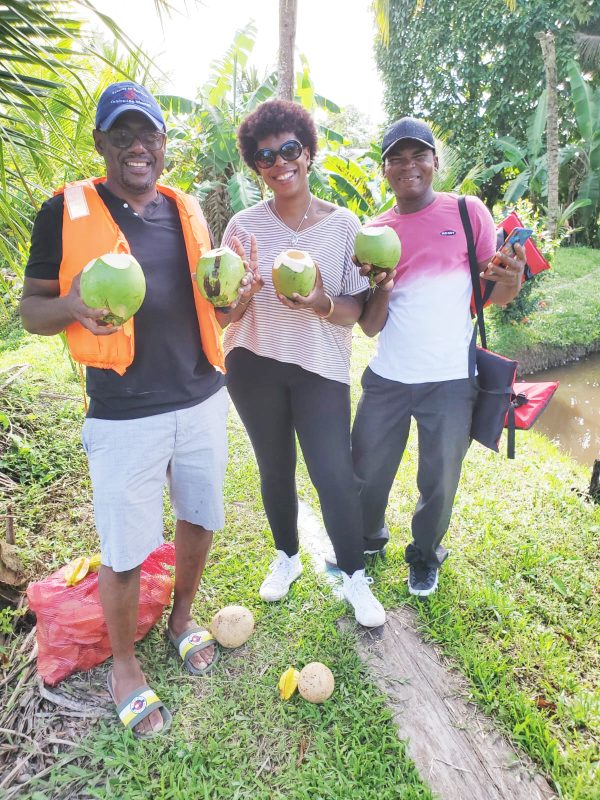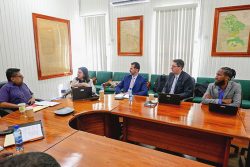When he was 16 years old, Jermaine Joseph of Wismar, Linden gained admission to the Guyana School of Agriculture (GSA) to pursue the diploma in agriculture. Two years later, having successfully achieved it, and unsure of what the future held for him, he went into teaching, then agricultural extension work and is now an administrator of the Guyana Chapter of the Partners of the Americas (POA) for which he is the country director.
“GSA made me who I am today. As someone who entered it at 16 years, it prepared me for adulthood. I had to wash my own clothes, and certain daily chores helped me to learn to shoulder responsibilities. I was turning my own keys. I had to plan, not just for school, but for life in general. The theoretical and practical aspects of life at GSA were a good orientation for life,” Joseph told Stabroek Weekend.
“At 16, I wasn’t ready for the world. GSA taught me all I needed to learn for survival. I was young and immature. We went to parties and all the extra curricular activities I took part in made me grow up quickly. These were all new to me because under my mother, Beverley Coppin’s roof, some of the things I did, I couldn’t do at home. She was very strict. She is a retired head teacher.” The GSA recently celebrated its 60th anniversary as a tertiary education institution.
Now 45, Joseph joined Partners of the Americas in 2018 as a field extension officer. In early 2023, he was promoted to deputy country director and in October the same year he was made the country director.
Before joining POA, Joseph was the field extension officer at the Inter-American Institute for Cooperation on Agriculture (IICA) for ten years.
While at IICA, Joseph collaborated with the Partners of the Americas on their shade house and biogas projects. “I have been supporting Partners of the Americas a very long time even before I started to work with them in 2018,” he asserted.
POA workings
It was not difficult moving from IICA to the offices of the Partners of the Americas in Providence, East Bank Demerara, which has been operational in Guyana since 1988. “The programmes were basically the same,” he noted.
POA is a non-governmental organisation that supports agricultural development locally and is currently working on another farmer-to-farmer programme which is funded by USAID. The programme works in five-year cycles. The last cycle ended in September 2023 and the new one started in October last year and will run until 2028.
To be eligible to receive assistance on the farmer-to-farmer programme, applicants need to have a farmers’ group/cooperative, or a company, or a farm registered with clear aims and objectives. This is inclusive of women, youth groups in agriculture, and agro-processors.. “We will conduct a needs analysis with you,” he explained. “We also take baseline information to get you into our system. Once that needs analysis is completed, we then prepare scopes of work on your needs. Once the projects are approved by the Washington-headquartered POA, we plan the assignments and then recruit specialists from the US who will volunteer their services for two-week periods. The reason we prefer to work with those groups with structures is because the farmers know where they are and where they want to go. It is heart- wrenching to know you spend over US$25,000 to bring in a specialist and empower someone who within six months is no longer interested.”
Some of the entities the POA has worked with include the National Agricultural, Research and Extension Institute (NAREI), Guyana Livestock Development Authority, the New Guyana Marketing Corporation and non governmental agencies like Food for the Poor.
POA has worked with small farmers groups including CV Farms, Bath Settlement Farmers and Agro-processors group, M&I Enterprise on the Corentyne Coast, Luke’s Manufacturing, and Original Juice on the Essequibo Coast.
The POA also worked with the Guyana Prison Service on its agricultural project, ‘Fresh Start’ and provided support in contour farming, fertility and irrigation.
“In terms of agritourism we worked with Mainstay/Wyaka Village Council and I consider that project one of the success stories of POA,” he said.
The farmer-to-farmer programme, Joseph said, takes on a bottoms-up approach compared to other agencies that have pre-planned programmes and strategies that they try to impose on groups based on what they believe would work for them.
“In our case we find out from the groups what you need help with,” he said. “Once that is given to us, we provide the necessary support. Most of these groups have a clear understanding of what they want as they have been involved in agriculture for several years. There isn’t much that I could tell them what to and what not to do when it comes to the practical aspects of agriculture. Nevertheless, there are technical challenges where they may need the additional support, and we assist in that area.”
His passion, he said, is in rural development. “I always look forward to working in the hinterland, the rainforest, nature. I really take pride in my work, in helping people all together.”
When he joined POA there were two field officers. He was responsible for the hinterland during which time he also did some work with the women’s group ‘Blue Flames’ in Mabaruma. The other field officer was responsible for the coastland.
Noting some of the challenges that face the agricultural sector in Guyana and its prospects of supplying all necessary foods for Guyana and the rest of the Caribbean, Joseph said he got tired of the word ‘potential’ and took it out of his vocabulary.
“Execution of policies, poor planning and development and allocation of human and other resources have been preventing us from reaching our potential, but these are areas I believe are being addressed,” he said.
“Farmers, especially the small farmers are not getting the necessary support to catapult them into expanding beyond their present capacity. We provide technical support but when the farmer or agro processor would have exhausted that support where they are at, what next?”
He noted the dearth of financial institutions geared specifically to support farmers in the country and the lack of agricultural insurance to secure farmers’ production in the event of any natural disaster.
“We saw what took place in the 2005 floods, where millions of dollars were lost in fresh food. But there is no agricultural insurance in place to cushion that happening again. These are just some of the shortcomings of agriculture in Guyana,” he lamented.
On the Caribbean Community’s goal to reduce the region’s high food import bill by 25 per cent from 2015 to 2025, he said, “We won’t be able to achieve it. As Partners of the Americas, we try to put in our lot with the hope that things will improve for the small and medium scale farmers and agro-processors.”
Background
Joseph, who calls himself a “proud” Lindener, attended Wismar Hill Primary School and had his secondary education at three schools in Linden. When he wrote the common entrance examination he was placed at Linden Foundation Secondary. After a year, he was transferred to New Silver City Secondary because it was expensive for his mother, a single parent, to meet his travel needs across the river from Wismar to Mackenzie every school day.
“New Silver City was closer and inexpensive for her,” he said. On entering fourth form at New Silver City, he found that the school did not offer some of the science subjects he wanted to write at the Caribbean Secondary Education Certificate examinations, so he sought and obtained another transfer to Christianburg-Wismar Secondary School.
“It was the multilateral school, and it was a beautiful one. I still believe the multilateral schools were the best schools ever built in Guyana. They were fully equipped and covered every aspect of education with a strong focus on pre-vocational areas,” he said.
He was successful in all the subjects he wrote.
After leaving school, some of his school friends applied for entry to the GSA and he joined them.
“Actually, my then passion was mechanics. While at school during my summer vacations my mom’s cousin managed a mechanic shop and I worked with him during the holidays. But I had the passion for agriculture also because I grew up seeing my maternal grandfather planting crops. He had a farm, and I used to be there on the farm with him,” he recalled. After graduating from GSA in 1998, Joseph taught for a year at Christianburg-Wismar Secondary.
“I then left that job and went into the interior to work with Mazda Mining Company as a supervisor. That didn’t work out,” he stated.
He returned to Georgetown and started a programme at the University of Guyana in 1999. After one semester he sought a leave of absence and returned to Linden.
“My mom got into a serious motor vehicle accident. She was bedridden for a year. I am the eldest and my younger brother and sister were still at school. I was forced to quit UG and I returned to manage the home and to take care of her. When she was discharged from the hospital she was in a cast from her ankle to her head. It was a serious and difficult period,” he recalled.
In 2000, at home and with no income coming in, Joseph returned to teaching.
At that point in his life, he felt, “Maybe teaching is my destiny.”
In 2001, he started the in-service teachers’ training programme offered by the Cyril Potter College of Education. This meant he had to work and study. He specialised in agricultural science. Classes were held in the evening. He had applied for leave of absence from UG but by the time he finished CPCE his leave of absence had expired, and he was not granted a further extension. He graduated from the in-service training programme in 2003 and taught for a while in the secondary department of Kara Kara Primary School and New Silver City Secondary in Linden, closer to home.
He subsequently moved to Georgetown and taught at North Ruimveldt Multilateral School, D’Urban Backlands Practical Instruction Centre and Beterverwagting Practical Instruction Centre. He taught agricultural science, integrated science and principles of business. He taught for ten years.
Joseph returned to UG in 2018 and obtained his bachelor’s degree in industrial relations and public management in 2021 all the while working and studying. He is now in his final year of a master’s degree in management at UG and expects to graduate next year.
IICA, hydroponics
In 2008, while teaching Joseph saw an advertisement in a newspaper in which IICA was seeking a field extension officer.
“I applied and I got the job. I worked with IICA from 2008 to 2018. I was responsible for technology and innovation. I promoted hydroponics and biogas technology,” he said.
Hydroponics is the technique of growing plants using a water-based nutrient solution instead of soil. Biogas is a gaseous renewable fuel that is produced from waste matter such as food or animal waste and which is broken down by microorganisms in the absence of oxygen.
Joseph has two manuals on hydroponics, ‘Hydroponics home based vegetable production systems’ – June 2010, and ‘Climate smart agriculture system, shade house production,’ which could be found on IICA’s website: http://www.iica.int
“IICA was definitely a new dispensation for me,” he revealed. “It really expanded my horizon in terms of all that is possible. Prior to IICA, I had never travelled on an airplane. After I joined IICA my first trip was to EARTH University, Costa Rica where I spent four months specialising in hydroponics and biogas technology. I came back to Guyana in 2009 championing hydroponics and biogas technology.”
Joseph also worked in short stints in Suriname and St Kitts and Nevis where he promoted hydroponics and biogas technologies through IICA.
With IICA he gained a lot of international experience while visiting several countries including Brazil, to see modern agricultural practices and to attend conferences and workshops.
He noted that a few farmers practise hydroponics farming locally.
“It has not caught on on a large scale because of the unavailability of the inputs, mainly the plant food/hydroponic fertiliser in Guyana. Most of the people who practise hydroponics on a commercial scale import their own inputs,” he said.
He noted that CV Farm at Friendship, East Bank Demerara, has mastered the technology of hydroponics and focuses primarily on lettuce farming.
Victoria Greens Hydroponics Farm run by the National Agricultural Research and Extension Institute is another success story. Plympton Farms, which has Guyana’s largest outdoor hydroponics farm and greenhouse system, and which was founded in 2012, supplies the oil and gas sector with fresh, leafy vegetables.
With biogas, not many people practice that at present, he said. “We had a few projects but that fell through mainly because of the unavailability of the inputs, mainly, the biodigester,” he added. “A lot of people want to get into it because it’s cheap energy, methane, converted from organic materials for domestic purposes, but the biogas materials aren’t readily available in Guyana.”
He said that almost on a daily basis people still call him for advice on hydroponics and biogas technology.
“Of course, my responsibilities from being a field officer to an administrator have shifted but I still give as much advice and where possible, visit,” he said.

